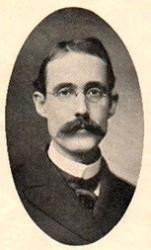Planning worship?
Check out our sister site, ZeteoSearch.org,
for 20+ additional resources related to your search.
- |
User Links
Person Results
Marion Franklin Ham

1867 - 1956 Author of "I hear Thy voice, within the silence speaking" in Christian Worship and Praise Born: February 18, 1867, Harveysburg, Ohio.
Died: July 23, 1956, Arlington, Massachusetts.
Buried: Mount Auburn Cemetery, Cambridge, Massachusetts.
Ham began his career as a journalist and bank clerk in Chattanooga, Tennessee. Ordained a Unitarian minister in 1898, he pastored in Chattanooga (1898-1904); at the First Church in Dallas, Texas (1904-09); and in Reading (1909-34), Waverly (1934-42), and Gardner, Massachusetts (1943-45). The Meadville Theological School in Chicago, Illinois, awarded him a Doctor of Divinity degree in 1942, the year he retired. Ham’s works include:
The Golden Shuttle, 1896
The Kinchin Stories, 1914
Songs of the Spirit, 1932
Songs of Faith and Hope, 1940
O Mother-Heart, 1941
Keeper of the Flame, 1945
Freedom, 1950
Songs at Sunset, 1951
Songs of a Lifetime, 1953
In a Rose Garden, 1954
www.hymntime.com/tch/
Marion Franklin Ham
Felix Mendelssohn-Bartholdy

1809 - 1847 Person Name: Felix Mendelssohn Composer of "CONSOLATION (Mendelssohn)" in The Cyber Hymnal Felix Mendelssohn-Bartholdy (b. Hamburg, Germany, 1809; d. Leipzig, Germany, 1847) was the son of banker Abraham Mendelssohn and the grandson of philosopher Moses Mendelssohn. His Jewish family became Christian and took the Bartholdy name (name of the estate of Mendelssohn's uncle) when baptized into the Lutheran church. The children all received an excellent musical education. Mendelssohn had his first public performance at the age of nine and by the age of sixteen had written several symphonies. Profoundly influenced by J. S. Bach's music, he conducted a performance of the St. Matthew Passion in 1829 (at age 20!) – the first performance since Bach's death, thus reintroducing Bach to the world. Mendelssohn organized the Domchor in Berlin and founded the Leipzig Conservatory of Music in 1843. Traveling widely, he not only became familiar with various styles of music but also became well known himself in countries other than Germany, especially in England. He left a rich treasury of music: organ and piano works, overtures and incidental music, oratorios (including St. Paul or Elijah and choral works, and symphonies. He harmonized a number of hymn tunes himself, but hymnbook editors also arranged some of his other tunes into hymn tunes.
Bert Polman
Felix Mendelssohn-Bartholdy
Arthur Sullivan

1842 - 1900 Person Name: Arthur Seymour Sullivan Arranger of "MARLBOROUGH" in Services for Congregational Worship. The New Hymn and Tune Book Arthur Seymour Sullivan (b Lambeth, London. England. 1842; d. Westminster, London, 1900) was born of an Italian mother and an Irish father who was an army bandmaster and a professor of music. Sullivan entered the Chapel Royal as a chorister in 1854. He was elected as the first Mendelssohn scholar in 1856, when he began his studies at the Royal Academy of Music in London. He also studied at the Leipzig Conservatory (1858-1861) and in 1866 was appointed professor of composition at the Royal Academy of Music. Early in his career Sullivan composed oratorios and music for some Shakespeare plays. However, he is best known for writing the music for lyrics by William S. Gilbert, which produced popular operettas such as H.M.S. Pinafore (1878), The Pirates of Penzance (1879), The Mikado (1884), and Yeomen of the Guard (1888). These operettas satirized the court and everyday life in Victorian times. Although he composed some anthems, in the area of church music Sullivan is best remembered for his hymn tunes, written between 1867 and 1874 and published in The Hymnary (1872) and Church Hymns (1874), both of which he edited. He contributed hymns to A Hymnal Chiefly from The Book of Praise (1867) and to the Presbyterian collection Psalms and Hymns for Divine Worship (1867). A complete collection of his hymns and arrangements was published posthumously as Hymn Tunes by Arthur Sullivan (1902). Sullivan steadfastly refused to grant permission to those who wished to make hymn tunes from the popular melodies in his operettas.
Bert Polman
Arthur Sullivan


 My Starred Hymns
My Starred Hymns


